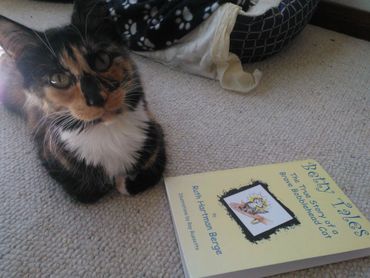Betty Tales
Betty Tales: The True Story of a Brave Bobblehead Cat

Betty Tales, The True Story of a Brave Bobblehead Cat is a sweet and funny story of a little black cat who became a member of the author's family. Written for third-grade reading level, the book is full of the heart-warming silly tales of Betty's mischief that help teach children about disabilities. It's not only pets that can be disabled and everyone can learn to "Climb Those Stairs!" from this determined cat.
Purchase Betty Tales for a child you love today and help them learn in a fun way, that disability doesn't mean less than and that they, too, can "Climb Those Stairs!" no matter what challenges stairs represent in their lives.

What can Betty teach YOUR child?
Here's one of my favorite stories about the impact one little cat can have on others:
I have a friend who is a third grade teacher. Her class did a run through of a school production and one of her students performed so badly that the teacher running the production suggested he be replaced. My friend, we'll call her Mrs. Jones, asked the other teacher for a couple of weeks to work with the student, we'll call him Eddie. If Eddie still didn't have his part at the next run-through, they'd move him to the chorus.
Mrs. Jones worked with Eddie on his part for a few days. The following week, I came in to speak about Betty Tales. I spoke with several classes of third graders and one class of fourth graders. I have no idea which class Eddie was in. When I go to speak to elementary school children, I talk a lot about goals, determination and persistence. Using Betty's difficulties in climbing stairs and her determination to climb them anyway, I tell the children that if they want something badly enough, it may not be easy to get and may take some work. For example, to be a ballerina, something I hear a lot of with third graders, we talk about how it takes years of practice, aching feet, missing out on afternoon play, etc... We talk about how Betty may slip down, but she digs her claws in and keeps climbing. I encourage them to think of whatever goal they have--whatever they want to be--that's THEIR stairs. At the end of my talks, I have the children standing up yelling "Climb those stairs!" at the top of their lungs.
Well, all Eddie wanted was to be in the school program. He went home that night and practiced his part with his Mom and his brothers. He went to bed mouthing the words. He woke up and practiced in the mirror as he brushed his teeth.
Time came for the next run-through. Mrs. Jones watched in surprise as Eddie totally nailed the part. He was absolute perfection and she applauded as he ran off the stage and came right to her.
"Miz Jones, Miz Jones," he hollered as he approached.
"You did a wonderful job, Eddie. I'm so proud of you!"
"I sure did!" He stopped and looked up at her. "I really climbed those stairs, didn't I?"
And that's why this little book is so rewarding to me. One child learned that he can do a lot more than he thought he could if he just works hard at it.
And he learned it from a little disabled cat.
Exactly what condition does Betty have?
It's called "cerebellar hypoplasia" commonly known as "bobblehead syndrome" or "CH." These cats (and other animals who have this condition) have a damaged or malformed cerebellum which is the section of the brain that controls balance and fine motor skills. It can be anywhere from "mild to moderate" (which is where Betty is) to very severe.
The ongoing goal of every person blessed to have one of these amazing animals in their home is to educate society, rescue organizations and veterinarians that a diagnosis of "CH" is not necessarily an automatic death sentence. For the most part, these sweethearts behave a lot like a regular-bodied cat, although anything placed on a kitchen counter is safe as they do have trouble leaping that high and they wobble when they walk.
All of the cats shown above have CH and all are well-loved, a blessing on their homes and a total inspiration to all who meet them. Shakey Puddin' Pie who recently passed over the rainbow bridge, traveled the United States with her owner and inspired more people than most humans ever get a chance to meet.
Consider adopting a disabled animal. The life you save may very well be your own. For more information, please go to one of my favorite sites, chcat.org.
Some of Betty's Fans... Betty's fans. Top row from left, Shakey Puddin' Pie, Flip, Winnie. Bottom row:. Swag and Twitch.





Ruth Hartman Berge
Copyright © 2019 Ruth Hartman Berge - All Rights Reserved.
